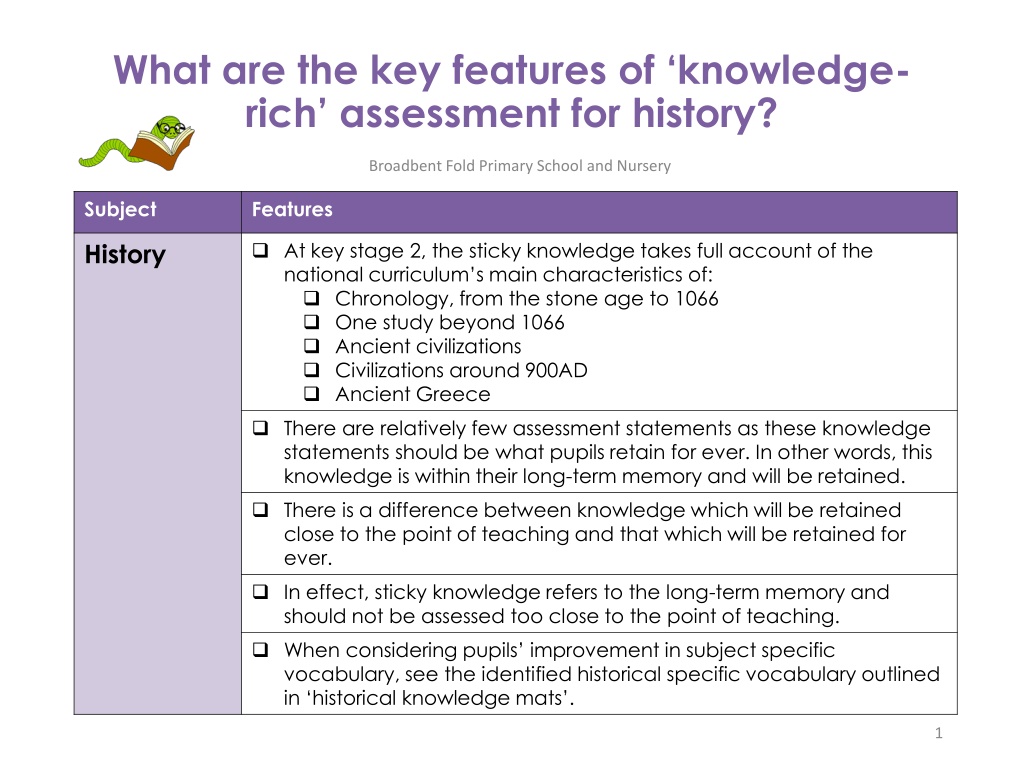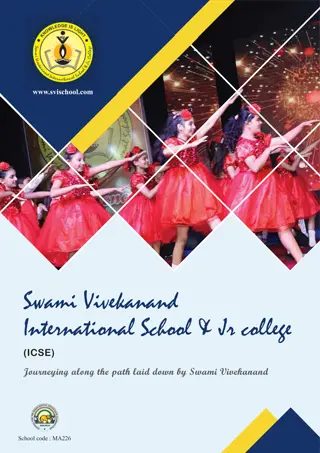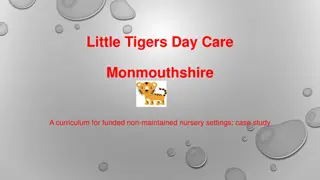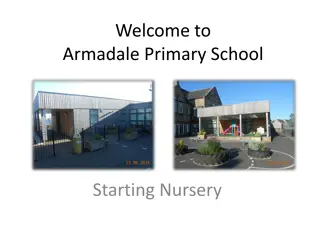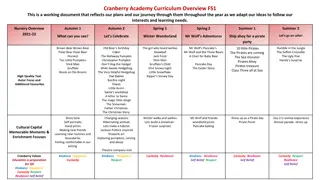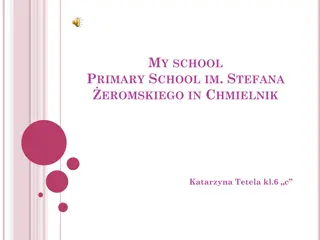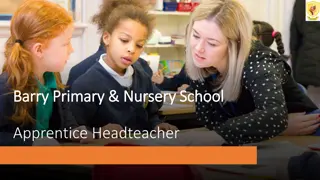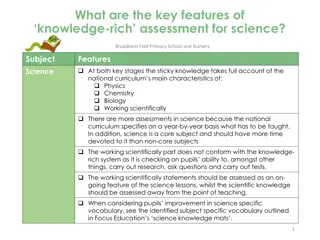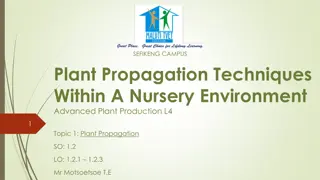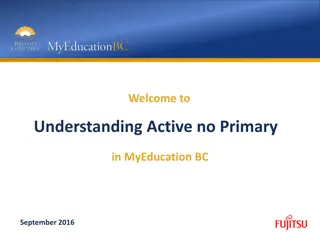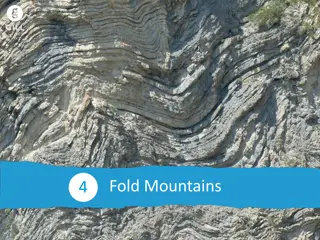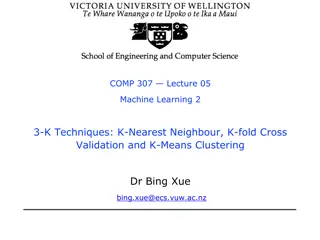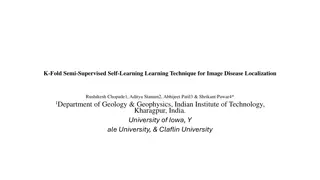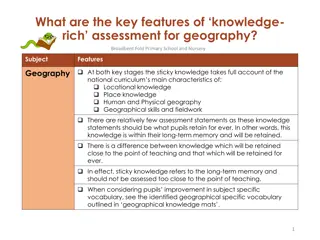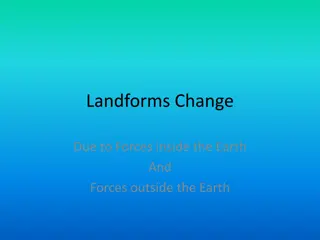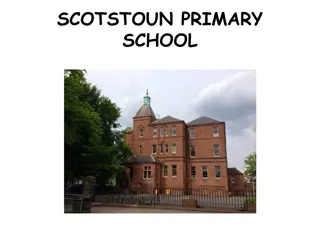Features of Knowledge-Rich Assessment for History at Broadbent Fold Primary School and Nursery
In history assessment at Broadbent Fold Primary School and Nursery, the focus is on sticky knowledge that aligns with the national curriculum's characteristics, emphasizing chronology, ancient civilizations, and specific vocabulary retention. Assessment statements are limited to ensure long-term memory retention. Key stage 1 explores living memory and significant historical figures, while key stage 2 delves into chronology up to 1066 and local studies related to various historical periods.
Download Presentation

Please find below an Image/Link to download the presentation.
The content on the website is provided AS IS for your information and personal use only. It may not be sold, licensed, or shared on other websites without obtaining consent from the author. Download presentation by click this link. If you encounter any issues during the download, it is possible that the publisher has removed the file from their server.
E N D
Presentation Transcript
What are the key features of knowledge- rich assessment for history? Broadbent Fold Primary School and Nursery Subject Features History At key stage 2, the sticky knowledge takes full account of the national curriculum s main characteristics of: Chronology, from the stone age to 1066 One study beyond 1066 Ancient civilizations Civilizations around 900AD Ancient Greece There are relatively few assessment statements as these knowledge statements should be what pupils retain for ever. In other words, this knowledge is within their long-term memory and will be retained. There is a difference between knowledge which will be retained close to the point of teaching and that which will be retained for ever. In effect, sticky knowledge refers to the long-term memory and should not be assessed too close to the point of teaching. When considering pupils improvement in subject specific vocabulary, see the identified historical specific vocabulary outlined in historical knowledge mats . 1
History: Key Stage 1 Beyond living memory Within living memory Lives of significant people Local history changes within living memory. Where appropriate, these should be used to reveal aspects of change in national life events beyond living memory that are significant nationally or globally [for example, the Great Fire of London, the first aeroplane flight or events commemorated through festivals or anniversaries] the lives of significant individuals in the past who have contributed to national and international achievements. Some should be used to compare aspects of life in different periods significant historical events, people and places in their own locality Know that the toys their grandparents played with were different to their own Organise a number of artefacts by age Know what a number of older objects were used for Know the main differences between their school days and that of their grandparents Name a famous person from the past and explain why they are famous Know the name of a famous person, or a famous place, close to where they live Year 1 Know about an event or events that happened long ago, even before their grandparents were born Know what we use today instead of a number of older given artefacts Know that children s lives today are different to those of children a long time ago Know about a famous person from outside the UK and explain why they are famous Know how the local area is different to the way it used to be a long time ago Differentiate between things that were here 100 years ago and things that were not (including buildings, tools, toys, etc. Year 2 2
History: Key Stage 2 Beyond 1066 CHRONOLOGY (Stone age to 1066) LOCAL STUDY To include: Stone age to Iron age Romans Anglo-Saxons Vikings An aspect of theme that takes pupils beyond 1066 A local study linked to one of the periods of time studied under chronology; or A local study that could extend beyond 1066 Know how Britain changed between the beginning of the stone age and the iron age Know the main differences between the stone, bronze and iron ages Know what is meant by hunter-gatherers Know a significant time in history WW2 Know this as a significant turning point in British History Local Study related to WW2- For example: The Air Raid Shelters in Stockport. Know how people lived and survived in WW2. Know significant events during WW2 in Manchester. Year 3 Know how Britain changed from the iron age to the end of the Roman occupation Know how the Roman occupation of Britain helped to advance British society Know how there was resistance to the Roman occupation and know about Boudica Know about at least one famous Roman emperor Know a significant time in history- The Tudors Know about the changing power of Monarchs using case studies such as: Henry VII, Henry VIII, Elizabeth Local Study related to The Tudors- For example: Chester/ Bramall Hall/ Ordsall Hall Know how people lived in the local area during The Tudor times. Know about evidence from the past and how it shaped our future. Year 4 3
History: Key Stage 2 CIVILIZATIONS from 1000 years ago ANCIENT ANCIENTS (approx. 3000 years ago) ANCIENT GREECE Cover each of and then choose one to look at in depth: Ancient Egypt Ancient Sumer Indus Valley Shang Dynasty Choose one of: Mayans Islamic Civilizations Benin Civilization Greek life and influence on the Western world Know some of the main characteristics of the Athenians and the Spartans Know about the influence the gods had on Ancient Greece Know at least five sports from the Ancient Greek Olympics Year 3 Know about, and name, some of the advanced societies that were in the world around 3000 years ago Know about the key features of either: Ancient Egypt; Ancient Sumer; Indus Valley; or the Shang Dynasty Year 4 4
History: Key Stage 2 Beyond 1066 CHRONOLOGY (Stone age to 1066) LOCAL STUDY To include: Stone age to Iron age Romans Anglo-Saxons Vikings An aspect of theme that takes pupils beyond 1066 A local study linked to one of the periods of time studied under chronology; or A local study that could extend beyond 1066 Know how Britain changed between the end of the Roman occupation and 1066 Know about how the Anglo- Saxons attempted to bring about law and order into the country Know that during the Anglo- Saxon period Britain was divided into many kingdoms Know that the way the kingdoms were divided led to the creation of some of our county boundaries today Use a time line to show when the Anglo-Saxons were in England Know a significant turning point in history- The Victorians and the significance of invention. Know changes in aspects of social history, such as crime and punishment, leisure, entertainment in the 20th Know about a period of history that has strong connections to their locality and understand the issues associated with the period. Know how the lives of wealthy people were different from the lives of poorer people during this time Local study related to The Victorians- for example: Styal Mill Year 5 Know where the Vikings originated from and show this on a map Know that the Vikings and Anglo-Saxons were often in conflict Know why the Vikings frequently won battles with the Anglo-Saxons Know about a theme in British history which extends beyond 1066 and explain why this was important in relation to British history Know how to place historical events and people from the past societies and periods in a chronological framework know how Britain has had a major influence on the world Year 6 5
History: Key Stage 2 CIVILIZATIONS from 1000 years ago ANCIENT ANCIENTS (approx. 3000 years ago) ANCIENT GREECE Cover each of and then choose one to look at in depth: Ancient Egypt Ancient Sumer Indus Valley Shang Dynasty Choose one of: Mayans Islamic Civilizations Benin Civilization Greek life and influence on the Western world Year 5 Know about the impact that one of the following ancient societies had on the world: the Mayan civilization; the Islamic civilization; or the Benin Know why they were considered an advanced society in relation to that period of time in Europe Year 6 6
Sticky Knowledge: History Year 1 Year 2 Know that the toys their grandparents played with were different to their own Know about an event or events that happened long ago, even before their grandparents were born Know what we use today instead of a number of older given artefacts Know about a famous person from outside the UK and explain why they are famous Know that children s lives today are different to those of children a long time ago Know how the local area is different to the way it used to be a long time ago Differentiate between things that were here 100 years ago and things that were not (including buildings, tools, toys, etc. Organise a number of artefacts by age Know what a number of older objects were used for Know the main differences between their school days and that of their grandparents Name a famous person from the past and explain why they are famous Know the name of a famous person, or a famous place, close to where they live 7
Sticky Knowledge: History Year 3 Know how Britain changed between the beginning of the stone age and the iron age Know the main differences between the stone, bronze and iron ages Know what is meant by hunter- gatherers Year 4 Know how Britain changed from the iron age to the end of the Roman occupation Know how the Roman occupation of Britain helped to advance British society Know how there was resistance to the Roman occupation and know about Boudica Know about at least one famous Roman emperor Know about, and name, some of the advanced societies that were in the world about 3000 years ago Know about the key features of either: Ancient Egypt; Ancient Sumer; Indus Valley; or, the Shang Dynasty Know some of the main characteristics of the Athenians and the Spartans Know about the influence the Gods had on Ancient Greece Know at least five sports competed in the Ancient Greek Olympics 8
Sticky Knowledge: History Year 5 Year 6 Know how Britain changed between the end of the Roman occupation and 1066 Know about the impact that one of the following ancient societies had on the world: the Mayan civilization; the Islamic civilization; or, the Benin Know where the Vikings originated from and show this on a map Know about how the Anglo-Saxons attempted to bring about law and order into the country Know that during the Anglo-Saxon period Britain was divided into many kingdoms Know that the way the kingdoms were divided led to the creation of some of our county boundaries today Know how the lives of wealthy people were different from the lives of poorer people Know that the Vikings and Anglo-Saxons were often in conflict Know why the Vikings frequently won battles with the Anglo-Saxons Know how to place features of historical events and people from the past societies and periods in a chronological framework know how Britain has had a major influence on the world Use a time line to show when the Anglo- Saxons were in England 9
